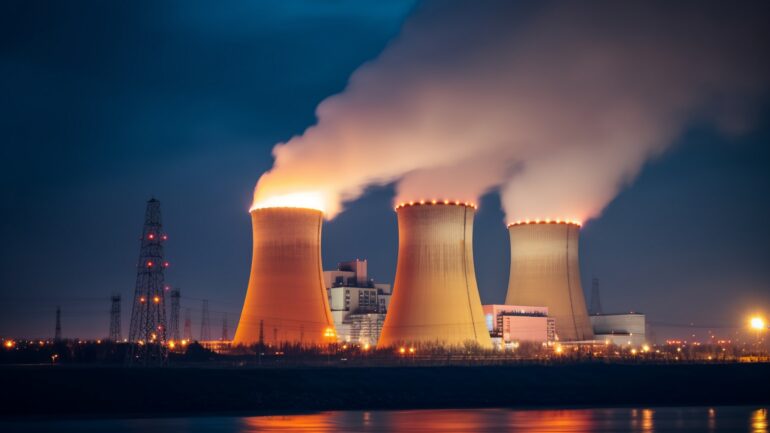A Fascinating Tango of Nuclear Energy & Artificial Intelligence

Part 2
The convergence of AI and nuclear energy reflects a shift in how we approach
sustainable technology. Let’s take a close look at five standout companies that
are redefining the nuclear landscape to find outwhy and how nuclear startups
are aligning with AI’s needs.
Power-Hungry AI Needs Nuclear Solutions
AI and machine learning models consume vast amounts of energy, especially during training phases. A 2019 study by the University of Massachusetts, Amherst estimated that training a single deep-learning model could emit as much carbon as five cars over their lifetime. Today, models are exponentially larger – think of OpenAI’s GPT-4 or Google’s Bard – resulting in correspondingly higher power demands. By 2022, the power draw of leading data centres was already doubling approximately every four years. According to the International Energy Agency, data centres could consume up to 20% of global electricity by 2030 if current trends continue.
Renewable energy sources like wind and solar, while critical to global energy strategies, lack the consistency needed for around-the-clock AI operations. Nuclear energy, however, provides a reliable, zero-carbon energy source that can support the high availability required by large AI workloads. With growing investment in advanced nuclear startups, small modular reactors have become a promising solution for stable, AI-grade power.
- TerraPower: Redesigning Nuclear for Tech-Energy Alignment
Founded by Bill Gates, TerraPower is among the most prominent startups in advanced nuclear technology. The company has pioneered the Natrium reactor, a sodium-cooled fast reactor capable of producing 345 megawatts of electricity – scalable up to 500 megawatts with an energy storage system. TerraPower’s Natrium design is compact, designed to be deployed closer to urban or industrial areas, a key factor as AI companies seeks power sources near data centres. TerraPower’s partnership with PacifiCorp (owned by Berkshire Hathaway) to build an SMR (Small Modular Reactors) in Wyoming could pave the way for similar partnerships with tech companies seeking to secure their energy future.
- Oklo: Building Ultra-Compact Reactors for Localised AI Data Centres
Oklo is a Silicon Valley-based startup backed by Sam Altman and known for its innovative approach to compact, localised nuclear reactors. Its “Aurora” reactor is designed to be particularly small – with a 1.5-megawatt capacity – enabling it to be deployed in unique locations such as remote data centres or distributed power networks. Oklo’s vision focuses on decentralisation, ensuring that energy is both close to demand sources and environmentally sustainable. These attributes align well with AI companies’ needs for distributed, on-demand energy close to data-intensive computing clusters, making Oklo a potential partner for tech giants looking to stabilise their energy sources for AI training.
- NuScale Power: Scalability and Speed in SMR Deployment
NuScale, a pioneering company in the SMR space, became the first US company to receive regulatory approval for its SMR design, which is set to begin commercial operation by the late 2020s. Supported by the US Department of Energy, NuScale’s modular design offers scalability from 77 megawatts to a total of 924 megawatts with multiple modules. Such flexibility allows data centres to scale up their power needs without relying on extensive new infrastructure, which is essential as AI applications grow. NuScale’s modules are highly adaptable, with potential to meet the fluctuating demands of AI processing. Major companies like Amazon and Google have expressed interest in NuScale’s potential, as it could allow them to add modular power solutions alongside expanding data infrastructure.
- X-Energy: Providing Safe, Reliable Power with High-Temperature Reactors
X-Energy has developed a high-temperature, gas-cooled reactor known as the Xe-100, which operates at 200 megawatts per unit. What makes X-Energy unique is its reliance on TRISO (tristructural isotropic) fuel, known for its safety and durability. This fuel type can withstand extreme temperatures, reducing risks of meltdown and boosting operational stability – an attractive factor for tech firms looking to power AI systems with minimal downtime. Google and Microsoft are among the tech companies taking an interest in X-Energy’s promise of safe, uninterrupted power.
- Helion Energy: Fusion-Based Power for a Carbon-Free Future
Though not yet commercially available, Helion Energy’s work in fusion technology has garnered substantial interest due to its long-term potential for AI applications. Backed by Sam Altman, Helion is aiming to produce the first commercially viable fusion reactor, capable of generating massive amounts of energy without the waste associated with traditional nuclear fission. While fusion remains in the experimental stage, a successful breakthrough by Helion could radically reshape energy generation, offering an endlessly renewable and clean energy source. Fusion technology would address AI’s future energy needs while contributing to carbon-free objectives, making Helion an exciting prospect in the eyes of tech visionaries.
The Challenges and Opportunities
While nuclear offers promising solutions, several challenges remain. The high costs of building and maintaining nuclear reactors, long development timelines, and complex regulatory landscapes are among the main obstacles that nuclear startups and tech companies must navigate. Public perception and safety concerns also pose challenges, especially as advanced nuclear technology is deployed in new, more distributed ways. However, government support is on the rise. The Biden administration has earmarked $6 billion for nuclear energy preservation and research, signalling that the US is prepared to invest in nuclear as a critical piece of a carbon-neutral future.
Furthermore, AI firms themselves have become vocal advocates for sustainable energy. As seen in recent public commitments to carbon neutrality from Microsoft, Amazon, and Google, these companies are likely to continue supporting nuclear projects that align with their sustainability pledges. Strategic investments and partnerships between nuclear startups and AI-driven tech giants could accelerate the rollout of SMRs, potentially creating a feedback loop of innovation in both fields.
Energising AI with Advanced Nuclear: A Sustainable Vision
The convergence of AI and nuclear energy reflects a shift in how we approach sustainable technology. Advanced nuclear reactors like SMRs represent not just a backup power source, but an essential infrastructure for powering future data-driven industries. As nuclear startups innovate, they’re positioning themselves as key players in an ecosystem that includes AI, cloud computing, and other energy-intensive technologies. The backing of tech giants indicates confidence in the scalability, safety, and environmental advantages of nuclear power, which could, in turn, help drive nuclear innovation even further.
The question remains: how quickly can nuclear energy scale to meet AI’s demands? The answer will define not just the future of computing, but the role of nuclear power in a technology-driven, sustainable future. Keep an eye on these nuclear startups – their success could well be the catalyst that brings AI’s potential to full fruition while keeping our planet’s needs in check.
[Concluded]
Acknowledgement: www.goldmansachs.com





